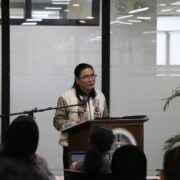Access to information for agricultural resilience

Agriculture in the Philippines faces a lot of challenges. Filipino households pay more for food than their Southeast Asian neighbors—often more than double. At the same time, agricultural workers, who make up 24 percent of the labor force, remain the country’s poorest, despite the higher food prices. This paradox is fueled by systemic issues, including the sector’s lagging growth rate, which hovers at a mere 1.1 percent annually.
One of the causes for food insecurity and farmer poverty is lagging growth of the Philippine agriculture sector, which has hovered at around 1.1 percent per annum over the past five years.
One significant barrier to agricultural growth is the lack of access to reliable agricultural data, starting with government information. Makati Business Club (MBC) and the Center for International and Private Enterprise’s report, “The Business Case for FOI: Agriculture,” highlights how fragmented and inaccessible information undermines resilience, efficiency, and investment in the agricultural sector. Passing a comprehensive freedom of information (FOI) law would address these gaps by ensuring that government data is accessible, timely, and accurate. Such transparency is essential to empowering farmers and fostering sustainable growth in the agriculture sector.
Information deficit and its impact. Farmers, cooperatives, and agricultural start-ups often depend on local government units (LGUs) for information on weather forecasts, training programs, and market data. However, the agriculture information space is fragmented, with each city or provincial agriculturist holding silos of localized data. A lack of centralized or nationwide agricultural information complicates planning and operations. For example, a startup working to strengthen onion supply chains cited the absence of data on alternative growing areas, making it impossible to mitigate risks from calamities.
At least 95 percent of the country’s onions are produced in Bongabon, Nueva Ecija. A calamity in this area would cripple the onion supply for businesses and households nationwide. Yet, information on other areas to grow onions is scarce. It is difficult to make food supply chains resilient when businesses have to request information from each city or province’s Provincial Agriculturist Office and Municipal Agriculturist Office.
Large businesses and foreign investors face similar hurdles. A firm seeking nationwide data on suitable areas for high-value crops found that the Department of Agriculture (DA) lacked basic projections and mapping information. In some cases, the private sector ends up bridging the data gap. For instance, an agri-goods aggregator supplies inventory updates to the DA, while another company collaborates with the agency to create a soil map.
Small businesses face local and national challenges. The experience of micro, small, and medium enterprises and cooperatives underscores the uneven landscape of accessing information. At the barangay and municipal levels, smaller businesses often benefit from closer relationships with local officials. Yet, they face significant barriers when dealing with national government agencies like the Bureau of Internal Revenue, Securities and Exchange Commission, and Department of Science and Technology. Delays, inconsistent requirements between central and regional offices, and unclear communication channels create bottlenecks that increase costs and stifle growth.
Why FOI matters. An FOI law would break down these barriers by requiring all levels of government—including LGUs—to make information readily accessible. This transparency would empower farmers and cooperatives to plan more effectively, make informed decisions, and adapt to challenges like climate change. For businesses, streamlined access to agricultural data would enhance supply chain resilience and attract investments.
Moreover, equal access to information is essential for a fair market economy. By institutionalizing transparency, FOI can drive innovation, reduce inefficiencies, and promote accountability, creating a ripple effect that benefits not just the agriculture sector but the entire economy.
Unlocking agricultural potential. The agriculture sector holds immense potential to address food insecurity, farmer poverty, and economic growth. However, this potential can only be realized with accessible, accurate, and timely information. By passing a comprehensive FOI law, the Philippines can take a critical step toward building a resilient, data-driven agricultural sector that meets the needs of its people and contributes to global competitiveness.
For more insights, read MBC’s full report, “The Business Case for FOI: Agriculture,” on our website.
—————-
“The Business Case for FOI: Agriculture” was written by Catch Ofilada, former director of policy and projects at the Makati Business Club. The article was summarized by Geeta Keswani, projects and grants manager at MBC.
—————-
Business Matters is a project of the Makati Business Club (makatibusinessclub@mbc.com.ph).

















